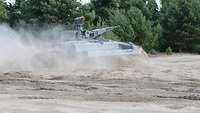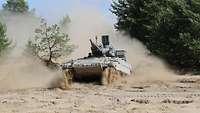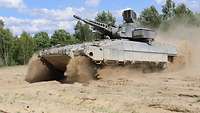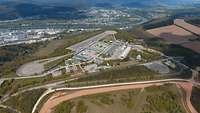Upgrade: Successful testing of the improved Puma armored infantry fighting vehicle
Upgrade: Successful testing of the improved Puma armored infantry fighting vehicle
- Date:
- Place:
- Trier
- Reading time:
- 3 MIN
Like all Bundeswehr military weapon systems, the Puma armored infantry fighting vehicle is continuously upgraded to the latest state of technology to increase its combat effectiveness. The Puma was recently put through extensive testing at the Oberlausitz military training area in the region of Upper Lusatia to ensure its operational capability despite an increase in weight.
Three weeks of extensive testing
The operational readiness and the safety of the forces rely on the future viability of the Bundeswehr’s weapon systems.
That is why a team at the Bundeswehr Technical Center for Land-Based Vehicle Systems, Engineer and General Field Equipment (WTDWehrtechnische Dienststelle 41) in Trier put the upgraded Puma through its paces during a three-week trial period.
1,300 kilometers under extreme conditions
Conditions at the training area were tremendously challenging: Due to the persistent drought, the sandy test tracks were extremely dusty, and thousands of tiny dust particles threatened to enter even the smallest cracks of the Puma. How would the vehicle react to that? Would the air filter be strong enough? How would the deep sand affect the mobility?
To answer these questions, the test personnel had to drive the Puma again and again through the sandy soils of the Oberlausitz training area. In total, they covered a distance of almost 1,300 kilometers. The extreme heat as well as the excessive dust presented a great challenge to both the drivers and the material.
New technology on board
Moreover, a tactical laser-based weapon training system was installed in the test vehicle. This weapon training system allows the units to simulate a full combat scenario including interaction with other weapon systems like main battle tanks or artillery and infantry. To this end, electric weapon and effects simulators were attached to the Puma.
This new system, too, had to cope with the dusty tracks and rough driving conditions.
Improvements come with additional weight
The testing was extensive and marked the completion of a so-called weight increase campaign. That means that the test vehicle was loaded with an additional weight of two tons compared to the weight of the current production vehicle.
The reason for this is rather simple: Experience shows that military vehicles often increase in weight in the course of their being used by the troops as they are, for example, equipped with a heavier armor protection or enhanced weapons.
This is why during the testing it was closely observed whether the drive elements like the engine and the gearbox as well as the chassis could withstand the increased weight and the resulting additional loads.
Testing successfully completed
As the technology is deliberately pushed past its limits during this kind of tests, equipment might also get damaged as a result. In the end, all this is done to ensure the safety of the soldiers. The few deficiencies detected in the Puma will now be closely examined.
“The Puma did well in Upper Lusatia. All the assemblies met the mileage requirements for the 45-ton weight increase campaign – that’s a great result,” said Cord S., who successfully completed the testing with his team.






